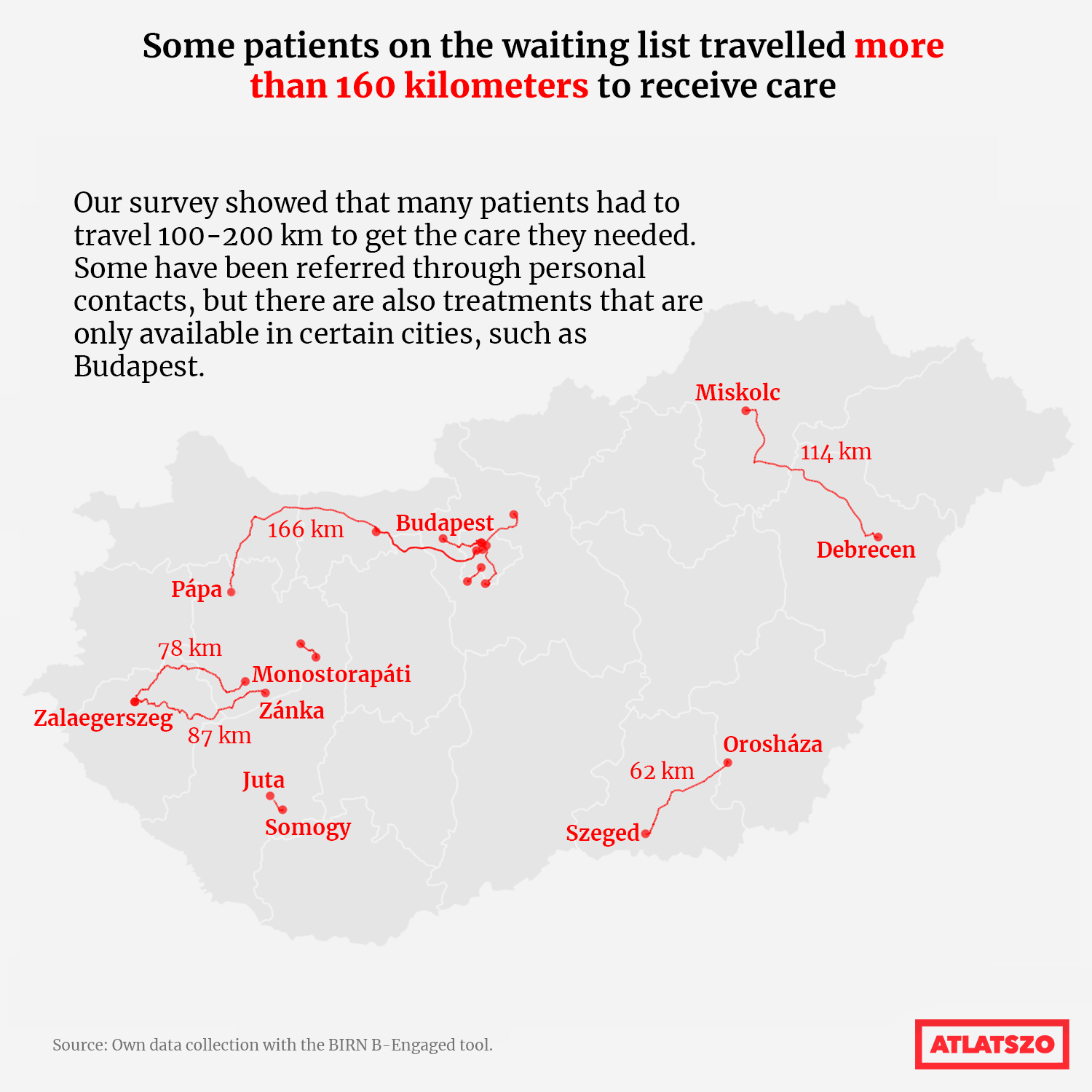The https://english.atlatszo.hu use cookies to track and profile customers such as action tags and pixel tracking on our website to assist our marketing. On our website we use technical, analytical, marketing and preference cookies. These are necessary for our site to work properly and to give us inforamation about how our site is used. See Cookies Policy
More and more patients turn to private healthcare to avoid long waiting lists in Hungary
With long hospital waiting lists, more and more patients are turning to alternative solutions to reduce waiting times. A survey by Atlatszo reveals that some patients travel hundreds of kilometres for an operation. And those who can afford it turn to private health care, which usually promises faster treatment, but patients have to dig deep into their pockets. For many procedures, we found significant differences in the time needed to access care between the capital and rural cities, exacerbating inequalities.
Istvan had been having symptoms since early 2023. Soon, he discovered that he would need hernia surgery. His doctor told him he could have the operation in May 2024. After considering the possible consequences of the long waiting, Istvan went to a private hospital, where he had to pay 650 000 HUF.

And he’s not the only one: from more than 200 people who completed Atlatszo’s survey on hospital waiting lists, eighteen said they had paid for the treatment because of the long wait. Some reported that their job made it essential to have a clear vision, so they didn’t even consider waiting a year and a half for cataract surgery. „Even in private health care, there was a waiting list,” the patient told us, adding that after four months, they had eye surgery at a private clinic for nearly 1 million HUF. Several people also reported unbearable pain, which made them unable to wait any longer.
“We pay social security contribution and get nothing for it”
Kamilla is in her late 20s and found out this spring that she has endometriosis. However, her symptoms started long before that, about a year ago, when she had a gynecological examination, but doctors found nothing.
Due to her specific type of endometriosis, there are only a limited number of locations where doctors are able to perform this surgery. According to reports from fellow patients, it takes at least half a year to get the first appointment, and from then on, waiting for surgery takes about a year and a half. She didn’t want to wait that long and also feared complications. “I think it’s also a scary thing that by the time you get there, it’s either going to be much worse or you could be in a life-threatening condition,” she said, explaining her decision to go to a private clinic in the countryside.
At the end of June, she underwent the operation, having to wait a month and a half.
“It’s annoying that I’ve been paying social security contributions for many years, but I get nothing for it. In addition, I had to pay almost three million HUF. All this to avoid waiting two years for the surgery,” she added.
Private healthcare is a big business
The experiences of those who completed the survey of Atlatszo are not unique: more and more Hungarian patients are turning to the private sector, especially since the coronavirus pandemic. The National Health Insurance Fund Management (NEAK) also noticed that an increasing number of people are turning to private healthcare in Hungary. According to their data, compared to 2019, less than 80 percent of patients were treated in public healthcare last year. In inpatient care, one in 20 services was provided by the private sector, with elderly and chronic patients typically staying in public healthcare.
According to a study by Political Capital, the rise of private healthcare has several reasons, including long waiting lists in the public health system, shortages of staff and capacity, and dissatisfaction with care.
According to the analysis of Portfolio,
the latest figures show that the market has practically doubled in three years.
We looked at how the net sales and after-tax profits of the largest private hospitals have evolved over the past year.
One of the largest private providers, Medicover, is not included in the list because although it was due to publish its report by May, last year’s report is still not available. However, the 2021 figures show that they achieved an outstanding result in terms of profit, closing 2021 with a profit of HUF 3 billion and a net turnover of nearly HUF 20 billion.
The TritonLife Group (nearly 900 million), Swiss Medical Services (760 million), and Buda Health Centre (451 million) also achieved lower, but still remarkable, after-tax results of several hundred million euros. However, three private institutions made a loss last year.
Some travel hundreds of kilometres to get care
Private healthcare is not the only solution for those who want to shorten waiting times. Twenty-three respondents said that they had not gone to their local hospital. It can happen, for example, if the doctor works in several institutions and the patient registers in the hospital where the waiting time is expected to be shorter.
Data shows many patients have had to travel up to 100-200 kilometres to get care. For example, one patient was sent from Papa to Budapest for knee replacement surgery, as it was impossible to perform this type of surgery in their hometown.
According to our calculations, the patient had to travel 166 kilometres by car, the shortest route.
Another patient travelling from Miskolc to Debrecen had to travel about 114 kilometres at best. In addition, some patients travelled more than 60 kilometres from Szeged to Orosháza or from Zanka and Monostorapáti to Zalaegerszeg. In more fortunate cases, patients living close to the capital, such as in Telki, Veresegyháza, or Dunaharaszti, travelled only a shorter distance of 10-30 kilometres.
Significant regional differences
In some cases, patients have travelled hundreds of kilometres not to reduce waiting times but rather because they had no other choice due to the fact that some operations are not performed in all hospitals.
It means that people living in rural areas have to travel longer, and the limited facilities can also significantly increase the waiting list at a given hospital as more patients are waiting in one institution. Even if the operation is performed in rural towns, the capacity is much smaller than in Budapest, so waiting times are usually longer.
Using data downloaded from the NEAK waiting list database for February-July this year, we looked at the three longest waiting lists of patients in Hungary.
The analysis revealed that patients are queuing for hip or knee replacement surgery in almost all regions of the country. In Budapest, knee replacement surgery is performed in several hospitals, meaning that the waiting time is relatively short (less than two years), whereas,
in some rural towns, people usually have to wait much more in order to be scheduled for surgery.
In Szombathely, for example, patients have had to wait an average of 1471 days, or almost five years, over the last six months. In Győr, the average waiting time was three years. The same was the case for hip replacement surgeries.
Written and translated by Luca Pete and Zita Szopkó. This story’s original, more detailed Hungarian version can be found here. Soma Kiss and Krisztián Szabó contributed to the story. The article was produced with the support of the Balkan Investigative Reporting Network (BIRN). The survey was conducted using BIRN’s B-Engaged tool.



